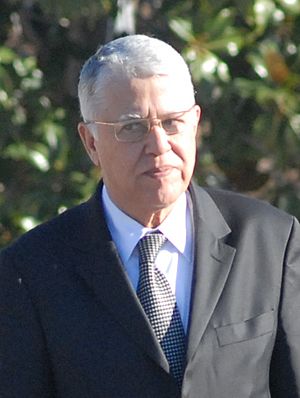Abbas El Fassi facts for kids
Quick facts for kids
Abbas El Fassi
|
|
|---|---|
|
عباس الفاسي
|
|

El Fassi in 2008
|
|
| 14th Prime Minister of Morocco | |
| In office 19 September 2007 – 29 November 2011 |
|
| Monarch | Mohammed VI |
| Preceded by | Driss Jettou |
| Succeeded by | Abdelilah Benkirane |
| Secretary-General of the Istiqlal Party | |
| In office February 1998 – 23 September 2012 |
|
| Preceded by | M'hamed Boucetta |
| Succeeded by | Hamid Chabat |
| Minister of State | |
| In office 7 November 2002 – 19 September 2007 |
|
| Prime Minister | Driss Jettou |
| Preceded by | Position established |
| Succeeded by | Position abolished |
| Minister of Employment, Professional Training, Social Development and Solidarity | |
| In office 6 September 2000 – 7 November 2002 |
|
| Prime Minister | Abderrahmane Youssoufi |
| Preceded by | Khalid Alioua |
| Succeeded by | Mustapha Mansouri |
| Personal details | |
| Born | 18 September 1940 Berkane, French Morocco |
| Political party | Istiqlal Party |
Abbas El Fassi was a well-known Moroccan politician and businessman. He served as the Prime Minister of Morocco from September 19, 2007, to November 29, 2011. El Fassi was a member of the Istiqlal Party, a major political group in Morocco. He took over the role of Prime Minister from Driss Jettou.
Contents
Early Life and Political Start
Abbas El Fassi was born in Berkane, Morocco, on September 18, 1940. He began his career in government in 1977. His first big role was as the Minister of Housing, where he worked on homes for people.
Important Government Roles
Over the years, El Fassi held many important jobs in the Moroccan government:
- From 1977 to 1981, he was the Minister of Housing. This role involved planning and managing housing projects.
- From 1981 to 1985, he served as the Minister of Handicraft and Social Affairs. In this job, he helped support traditional crafts and social programs.
- He also worked as an ambassador for Morocco. An ambassador represents their country in other nations. He was an ambassador to Tunisia and the Arab League from 1985 to 1990.
- Later, from 1990 to 1994, he was the ambassador to France.
- From 2000 to 2002, he was the Minister of Employment, Professional Training, Social Development and Solidarity. This role focused on jobs, training, and helping people in need.
- Before becoming Prime Minister, he was a Minister of State in the government led by Driss Jettou, from 2002 to 2007.
Becoming Prime Minister
King Mohammed VI chose Abbas El Fassi to be the Prime Minister on September 19, 2007. This happened after his party, the Istiqlal Party, won the parliamentary elections on September 7, 2007.
Forming a New Government
On October 15, 2007, King Mohammed VI officially appointed El Fassi's new government. This government had 33 members, not including El Fassi himself. It was notable because it included seven women, which was a significant step. The government was made up of members from five different political parties:
- The Istiqlal Party (El Fassi's party)
- The liberal Mouvement Populaire (MP)
- The Socialist Union of Popular Forces (USFP)
- The National Rally of Independents (RNI)
- The Party of Progress and Socialism (PPS)
This mix of parties showed how different groups worked together to lead the country.
See also
 In Spanish: Abás El Fasi para niños
In Spanish: Abás El Fasi para niños
 | Laphonza Butler |
 | Daisy Bates |
 | Elizabeth Piper Ensley |

